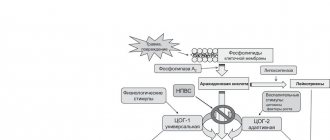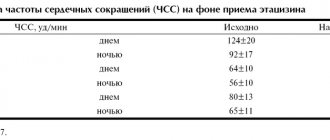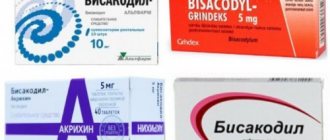The main task of Pancreatin is to compensate for the lack of pancreatic enzymes. The medication is prescribed for diseases of the pancreas and pathologies of the digestive organs, in which reactive pancreatitis may occur.
In some cases, Pancreatin is used to normalize food digestion and eliminate symptoms of poisoning from unusual foods and alcohol.
Indications for use
The annotation indicates for which disorders and diseases it is advisable to use Pancreatin.
Indications for use:
- Late pancreatitis appearing after transplantation
- Chronic diseases of the liver, biliary tract
- Preparation for ultrasound of the abdominal organs
- Digestive tract dysfunction
- Insufficiency of exocrine pancreatic function in the elderly
- If it is necessary to carry out replacement therapy in case of diagnosing exocrine insufficiency of the digestive system
- Chronic pancreatitis
- Cystic fibrosis
- Removal of the pancreas
- Dyspepsia
- The need to normalize digestive processes
Pancreatin-Belmed tablets po enteric-soluble 25 units No. 10x5
Name
Pancreatin-Belmed tablet coated. k/r vol. 25 units per contact. cell pack №10x5
Description
Film-coated tablets, yellow to yellow-brown in color, with a biconvex surface. Unevenness and inclusions are allowed on the surface. When breaking the tablet, a specific smell is felt. The cross section shows two layers.
Main active ingredient
Pancreatin
Release form
Pills
Dosage
25 units
pharmachologic effect
Digestive enzyme agent. The pancreatic enzymes included in the composition (lipase, alpha-amylase, trypsin, chymotrypsin) promote the breakdown of proteins into amino acids, fats into glycerol and fatty acids, starch into dextrins and monosaccharides, improve the functional state of the gastrointestinal tract, and normalize digestive processes. Trypsin suppresses stimulated pancreatic secretion, producing an analgesic effect. The maximum enzymatic activity of the drug is observed 30-45 minutes after oral administration.
Indications for use
Disorders of the exocrine function of the pancreas (chronic pancreatitis, pancreatectomy), achylia. Preparation for X-ray examination and ultrasound of the abdominal organs.
Directions for use and doses
The drug is taken orally 3-6 times a day, during meals, without chewing and with plenty of liquid (water, fruit juices). The dose is set individually, depending on the age and severity of the digestive disorder. Adults and children over 14 years of age: the usual single dose is 50-100 units (2-4 tablets); the daily dose is 200-400 units (8-16 tablets). The average single dose for children 6-7 years old is 3 units (1 tablet), 8-9 years old – 25-50 units (1-2 tablets), 10-14 years old – 50 units (2 tablets). The duration of treatment can vary from several days (for indigestion, dietary errors) to several months and even years (if constant replacement therapy is necessary).
Use during pregnancy and lactation
The use of the drug during pregnancy and lactation is possible only if the expected benefit to the mother outweighs the potential risk to the fetus.
Impact on the ability to drive vehicles and other potentially dangerous mechanisms
The drug does not have a negative effect on the ability to drive a car or drive potentially dangerous machinery.
Precautionary measures
With long-term use, iron supplements are prescribed simultaneously.
Interaction with other drugs
Forms insoluble complexes with folates, as a result of which their absorption is significantly reduced. Reduces iron absorption (especially with long-term use). Concomitant use of antacids containing calcium carbonate and/or magnesium hydroxide may lead to a decrease in the effectiveness of pancreatin.
Contraindications
Hypersensitivity to the components of the drug, acute pancreatitis, exacerbation of chronic pancreatitis. Patients with hereditary diseases such as galactose intolerance, lactase deficiency or glucose-galactose malabsorption should not take Pancreatin-Belmed.
Compound
Each tablet contains: active substance: pancreatin - 25 units; excipients: calcium stearate (E - 470), methylcellulose (E - 461), lactose monohydrate, acrylic 93 A (methacrylic acid copolymer, quinoline yellow aluminum varnish, yellow iron oxide (E -172), black iron oxide (E -172), anhydrous colloidal silicon dioxide (E - 551), talc (E - 553), sodium lauryl sulfate (E - 487), sodium bicarbonate (E - 500), titanium dioxide (E -171)), triethyl citrate (E - 1505).
Overdose
Symptoms: hyperuricosuria, hyperuricemia. Children have constipation. Treatment: drug withdrawal, symptomatic therapy.
Side effect
Allergic reactions, rarely - diarrhea or constipation, nausea, discomfort in the epigastric region. With long-term use in high doses - hyperuricosuria, hyperuricemia, structures in the ileocecal region and in the ascending colon. If the above adverse reactions or adverse reactions not listed in these instructions for medical use of the drug occur, you should consult a doctor.
Storage conditions
In a place protected from moisture and light at a temperature not exceeding 25 ° C. Keep out of the reach of children.
How much to drink
When prescribing a medication, doctors use an indicator of lipolytic activity, which is converted into tablets.
Depending on how many times a person eats a day, the number of Pancreatin doses is divided into 5-6 parts. The intestines should not be left without enzymes even with a small snack. The doctor can prescribe up to 18 tablets of medication per day. Most often, a single dose varies from 2 to 4 tablets.
The medication should be taken before eating or immediately after eating. The tablets do not need to be chewed. The effect of the medication can be felt only an hour after taking it, the effect will last approximately 4 hours.
Pharmacodynamics and pharmacokinetics
Pancreatin is an enzyme drug that contains pancreatic enzymes: protease , trypsin , chymotrypsin , lipase , amylase .
The substance stimulates the secretion of its own enzymes of the pancreas and digestive tract (in particular, the stomach and small intestine), as well as the secretion of bile, normalizes the functional state of the digestive tract, improves digestion processes and the absorption of fatty, heavy or unusual foods.
Pancreatin capsules, dragees and tablets are coated with a special coating that protects them from dissolution before they enter the alkaline environment of the small intestine. That is, the shell prevents the active substance from decomposing under the influence of hydrochloric acid and the pH of digestive juice in the stomach.
Maximum activity of pancreatic enzymes is observed approximately half an hour after ingestion of Pancreatin capsules, dragees or tablets.
The effect of the drug is the combined effect of its individual components. For this reason, the determination of pharmacokinetic parameters, as well as the detection of metabolites of the active substance formed during its biotransformation in the body, is a rather complex task.
The components can only be traced using special markers or biological studies.
The effectiveness of pancreatin preparations is determined by the form of release (regular tablets, micro-sized tablets or mini-microspheres) and the characteristics of the clinical situation: for example, in the case of chronic pancreatitis in the acute phase, the best effect is achieved when using tablet dosage forms; for the correction of exocrine insufficiency of the pancreas, it is considered advisable to use micro-tablet forms of drugs .
How much to take
The course of treatment with the drug depends on the severity and type of disease. If the problem is only a malnutrition, the doctor will advise you to take the medication for several days.
For cystic fibrosis, replacement therapy is carried out throughout life.
You should not constantly take Pancreatin to eliminate the consequences of overeating. Regular supply of enzymes from the outside negatively affects the functioning of the gastrointestinal tract. In addition, weight loss may occur due to poor diet and problems with the functioning of the digestive tract.
Pancreatin analogues
Level 4 ATC code matches:
Digestin
Creon
Pancitrate
Mezim
Festal
Pankreoflat
Pancreazim
Enterosan
Panzinorm Forte
Panzinorm
Micrasim
Enzistal P
Penzital
Pangrol
Hermital
Abomin
Analogues of pancreatin are the following drugs:
- Biozyme
- Zimet
- Creon
- Lycreaza
- Mezim ( Mezim Forte )
- Micrasim
- Pangrol
- Panzinorm
- Pancreazim
- Kirschner's pancreas
- Pancreatin-ICN
- Pancretin LekT
- Pancreatin Forte
- Pancreatin 8000
- Pancreatin 25 units
- Pancreatin for children
- Pancreatin-Zdorovye Forte 14000
- Pankrenorm
- Pankreon
- Prolipase
- Trienzyme
- Uni-Festal
- Festal (Festal N)
- Enzistal
- Hermital
Which is better: Mezim or Pancreatin?
You can figure out what the difference between these drugs is based on the instructions for each of them, as well as on the basis of reviews from gastroenterologists who are faced with the need to prescribe them every day.
According to reviews of the drug by some doctors, Pancreatin is a more effective remedy in comparison with Mezim , since its protective shell is more perfect and prevents gastric juice enzymes from destroying the pancreatic enzymes contained in the drug.
The difference in price between these drugs is no less significant: Pancreatin is several times cheaper than Mezim (this is especially important for patients who are prescribed long-term use of medications that improve digestion).
Pancreatin or Creon - which is better?
What is the difference Creon and Pancreatin? The difference between the drug and Creon is that the latter is available in the form of minimicrospheres. This unique dosage form provides higher efficacy rates of Creon compared to conventional Pancreatin in the form of tablets and mini-tablets, a longer relapse-free period and a faster and more complete restoration of digestive function.
Is it possible for pregnant women
Before deciding to take Pancreatin, pregnant women should consult their doctor. It may not be necessary to take the drug.
The instructions for the medication do not indicate whether the medicine can be taken at such a crucial moment in life.
In the course of the studies, it became known that the use of Pancreatin at any stage of pregnancy does not have any effect on the development and growth of the intrauterine fetus.
Doctors usually prescribe medicine to pregnant women for:
- Gastritis with decreased production of gastric juice
- Chronic pancreatitis
- Disorders of the pancreas
special instructions
The dose of the drug must be adequate to the amount of enzymes that is necessary for the absorption of fats, taking into account the quality and quantity of food consumed.
With long-term use, iron supplements are prescribed simultaneously.
Impact on the ability to drive vehicles and machinery
The drug does not affect the ability to drive vehicles or engage in other potentially hazardous activities that require increased concentration and speed of psychomotor reactions.
Side effects
Therapy with Pancreatin extremely rarely leads to negative effects. In most cases, allergic reactions occur as side effects. Their manifestation is possible with individual hypersensitivity to the components of the medication.
With prolonged use of large doses of Pancreatin, in some cases hyperuricosuria develops. With this disease, uric acid urates accumulate and stones form.
It is extremely rare that in patients with cystic fibrosis, when using high doses, narrowing is observed in the ileocecal region and at the beginning of the colon.
Side effects from digestion are extremely rare:
- Pain in the epigastric region
- Diarrhea
- Nausea
- Constipation
- Intestinal obstruction
When using increased doses of Pancreatin in patients with cystic fibrosis, increased amounts of uric acid may be excreted in the urine. To prevent the formation of stones, in this group of patients it is necessary to regularly monitor the concentration of uric acid in urine.
Contraindications
Hypersensitivity to the components of the drug, acute pancreatitis, exacerbation of chronic pancreatitis, children under 6 years of age.
The drug contains lactose monohydrate, therefore its use is not recommended for patients with rare hereditary diseases associated with galactose intolerance, lactase deficiency or glucose-galactose malabsorption syndrome.
Carefully
In case of cystic fibrosis, the drug should be prescribed with caution, because the dose should be adequate to the quantity and quality of food consumed; the use of pancreatin in high doses is not recommended due to the increased risk of developing strictures (fibrous colonopathy).
Criteria for an adequately selected dose: increase in body weight, normalization of stool (less than 3 times a day, normalization of consistency), reduction of bloating.
Use during pregnancy and breastfeeding
The safety of using pancreatin during pregnancy has not been sufficiently studied. Use is possible in cases where the expected benefit to the mother outweighs the potential risk to the fetus.
During lactation, the use of pancreatin is not contraindicated.





